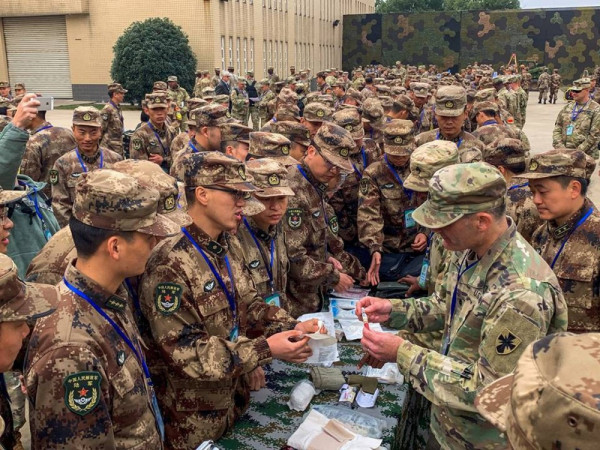Chinese Vice Foreign Minister Le Yucheng speaks on global peace and development

On May 6, 2022, Vice Foreign Minister Le Yucheng attended “Seeking Peace and Promoting Development: An Online Dialogue of Global Think Tanks of 20 Countries” and delivered a keynote speech titled, “Acting on the Global Security Initiative to Safeguard World Peace and Tranquility”.
The dialogue was jointly hosted by China Public Diplomacy Association and Renmin University of China, and organized by Chongyang Institute for Financial Studies, Renmin University of China. Former dignitaries, experts and scholars from 20 countries and representatives of international organizations to China participated in the dialogue online and offline.
Le noted that the COVID pandemic is raging, and the Russia-Ukraine conflict is still escalating. In the meantime, we are witnessing perverse attempts to wage a new Cold War, rampant hegemonism and power politics, and a rising tide of division and confrontation of the world.
Crises are lurking in the international political, economic and security order, presenting unprecedented challenges to peace and development, the underlying theme of our times. Facing these once-in-a-century challenges, China is determined to act as a responsible major country.
Recently, President Xi proposed a Global Security Initiative (GSI). GSI offers a fundamental solution to eliminating “the peace deficit” and contributes Chinese perspectives to meeting international security challenges. The idea is to take the new vision on security as the guiding principle, mutual respect as the fundamental requirement, indivisible security as the important principle, and building a security community as the long-term goal with the aim of fostering a new type of security that replaces confrontation, alliance and a zero-sum approach with dialogue, partnership and win-win results.
Le debunked the disinformation arising from the China-Russia joint statement that implied China had “prior knowledge” of Russia’s special military operation in Ukraine, and even “endorsed” it. It also accused China of standing on the wrong side of history for not joining the United States and other Western countries in condemning and sanctioning Russia.

Le illustrated China’s contributions to global security with facts and figures, and pointed out that China pursues an independent foreign policy of peace and determines its position based on the merits of the matter. China is a champion of world peace and a positive force for global security. China’s development reinforces the global dynamic in favour of peace and stability.
The Vice FM stated: “Our world today faces a swirling combination of change and instability. Crises and challenges emerge without cease, and factors undermining peace are building up. At such a critical moment in the development of humankind, we must act with the destiny and future of humanity in mind, step up to our responsibility, and rise above prejudice and contention.”
Le outlines five core priorities. First, it is important to stay committed to international law and universally recognised norms of international relations, and reject the attempt to replace international rules with “house rules”. In this global village, we need to respect each other, treat one another as equals and abide by common rules.
Second, it is important to stay committed to the principle of indivisible security, and reject the attempt to pursue one’s own security at the expense of others. As such, we must uphold the vision of common, comprehensive, cooperative and sustainable security, reject zero-sum games, competition and confrontation, take seriously the security of others, and safeguard the common security of all. Only by doing so can one achieve his own security.
Third, it is important to stay committed to global solidarity and cooperation, and reject the attempt to revive bloc politics and ideological confrontation. Any wishful attempt to preserve hegemony, gang up, form exclusive circles, pin undesirable labels on others, spread the ridiculous “democracy versus autocracy” narrative, or stoke major-country rivalry and divide the world on ideological grounds would land humanity in bigger trouble, rather than helping to address the common challenges facing humanity.
Fourth, it is important to stay committed to opposing unilateral sanctions, and reject the attempt to turn a regional crisis into a global one. Using the world economy, the development of countries and the wellbeing of their peoples as a weapon or a tool and creating and even aggravating multiple crises in order to tackle an existing crisis will shake the foundation of the international economic system and cause turmoil around the world.
Fifth, it is important to stay committed to security and stability in the Asia-Pacific, and reject the attempt to allow turmoil or war to arise in this region. We cannot allow bloc-based confrontation to repeat itself in the Asia-Pacific; we cannot allow certain countries to succeed in their self-serving attempt to drag the Asia-Pacific into conflict; we cannot allow small and medium-sized countries in our region to become the tool or victim of hegemony.







